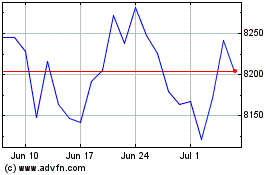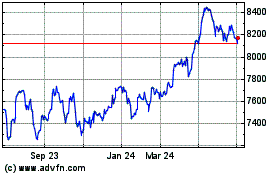EUROPE MARKETS: European Stocks Gain Broadly As Turkey's Lira Stabilizes
August 14 2018 - 4:45AM
Dow Jones News
By Mark DeCambre, MarketWatch
European stocks rose Tuesday, putting a pan-European index on
the verge of booking a gain for the first time in three sessions as
Turkey's currency meltdown showed signs of steadying.
What are markets doing?
The Stoxx Europe 600 rose 0.6% at 387, after shedding 0.3% on
Monday
(http://www.marketwatch.com/story/european-stocks-drop-as-investors-remain-focused-on-turkey-2018-08-13)
to finish at 384.91 amid escalating worries about Turkey's plunging
lira.
The gauge is showing a rise of 0.3% thus far this week but a
0.6% decline so far in 2018, according to FactSet data.
Germany's DAX 30 traded 0.7% higher at 12,440.47, after closing
Monday's session down 0.5%, while France's CAC 40 rose 0.4% to
5,433.01, following a slide of about 0.1% in the previous session.
The U.K.'s FTSE 100 , meanwhile, climbed 0.2% to 7,653.49, after a
0.3% fall for the index on Monday.
The euro traded at $1.1417, edging slightly higher from $1.1411
late Monday in New York, but stable.
What is driving the market?
European bourses turned higher early Tuesday as investors
attempted to shake off worries about the deterioration of Turkey's
currency, and a possible spillover effect from that decline.
Traders resumed tentatively buying stocks on the back of healthy
economic reports.
Meanwhile, the Turkish lira rose nearly 5% against the dollar on
Tuesday
(http://www.marketwatch.com/story/turkeys-lira-rallies-vs-the-dollar-on-tuesday-2018-08-14)
after a withering series of drops to historic lows against the U.S.
dollar. The slide has roiled global markets. The lira crisis,
kicked off partly by reports by the Financial Times (paywall)
(https://www.ft.com/content/51311230-9be7-11e8-9702-5946bae86e6d),
that the European Central Bank was concerned about contagion from
Turkey's currency slide to eurozone financial firms, took a turn
for the worst after U.S. President Donald Trump on Friday said he
authorized the doubling of steel and aluminum tariffs on
Ankara.
One dollar bought 6.5463 lira, compared with 6.8846 late Monday
in New York and one euro changed hands at 7.4645 lira , versus
about 7.9079 lira in the previous session, a gain of decline of
about 5.5% against the euro.
Trump's representatives on Monday told Turkey's ambassador that
negotiations between the nations cannot move forward to remove
sanctions against Ankara until detained evangelical pastor Andrew
Brunson is released from the country.
A report on expansion
(http://www.marketwatch.com/story/germanys-economy-sped-up-in-second-quarter-2018-08-14)
in Germany showed that Europe's second-largest economy saw growth
of 0.5% in the second quarter, with an annualized rate of 1.8%.
However, the report indicated that global trade tensions and
Turkey's currency crisis are clouding the business outlook.
Don't miss:A top London startup's CEO flags the biggest Brexit
threat to his industry
(http://www.marketwatch.com/story/a-top-london-startups-ceo-flags-the-biggest-brexit-threat-to-his-industry-2018-08-06)
What are strategists saying?
"Investors are becoming increasingly worried about how the
Turkish crisis would spread into other markets after yesterday's EM
currencies and equities selloff. So far, I think the risk of
contagion is limited and yesterday's selloff was due more to a
risk-off mood than a fundamental reason," wrote Hussein Sayed,
chief market strategist at FXTM, in a Tuesday research note.
"However, economies with large current account deficits such as
India, Argentina and South Africa will come under increased
economic pressure as the Fed continues to tighten monetary policy,"
he added.
Stock movers
Shares of Antofagasta PLC (ANTO.LN) fell 4.8% after the company
reported quarterly results, putting the miner among the worst
performer on the pan-European benchmark.
(END) Dow Jones Newswires
August 14, 2018 04:30 ET (08:30 GMT)
Copyright (c) 2018 Dow Jones & Company, Inc.
FTSE 100
Index Chart
From Aug 2024 to Sep 2024

FTSE 100
Index Chart
From Sep 2023 to Sep 2024
